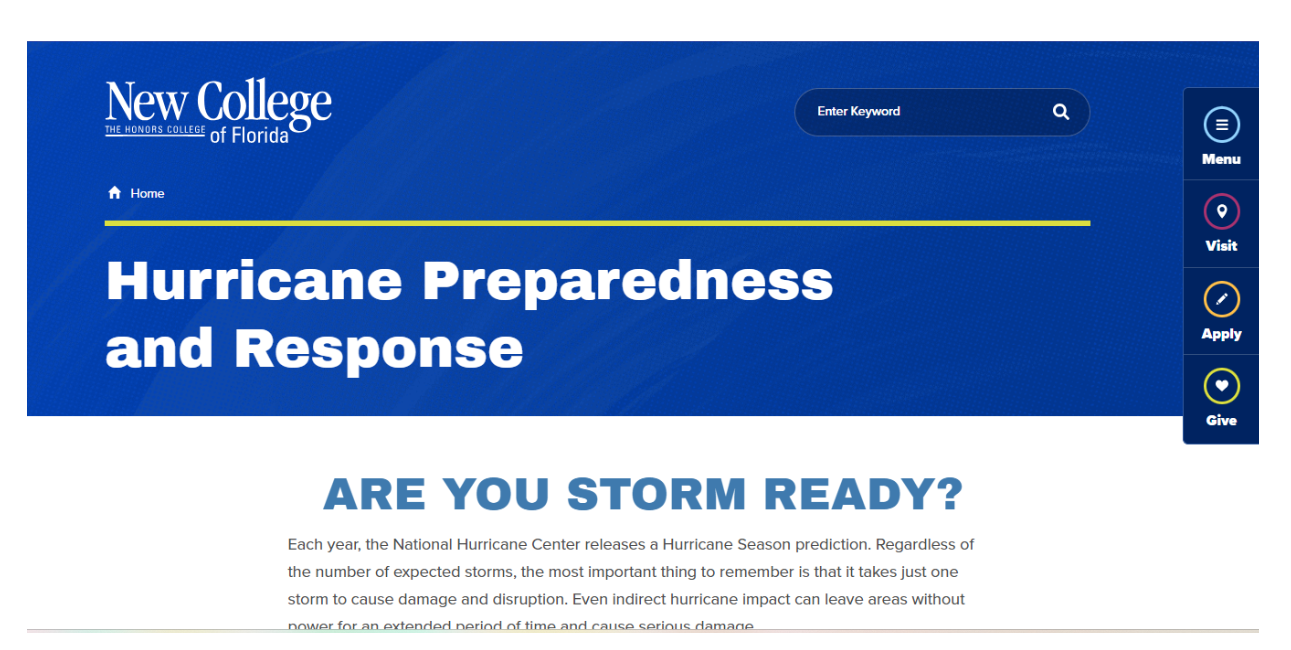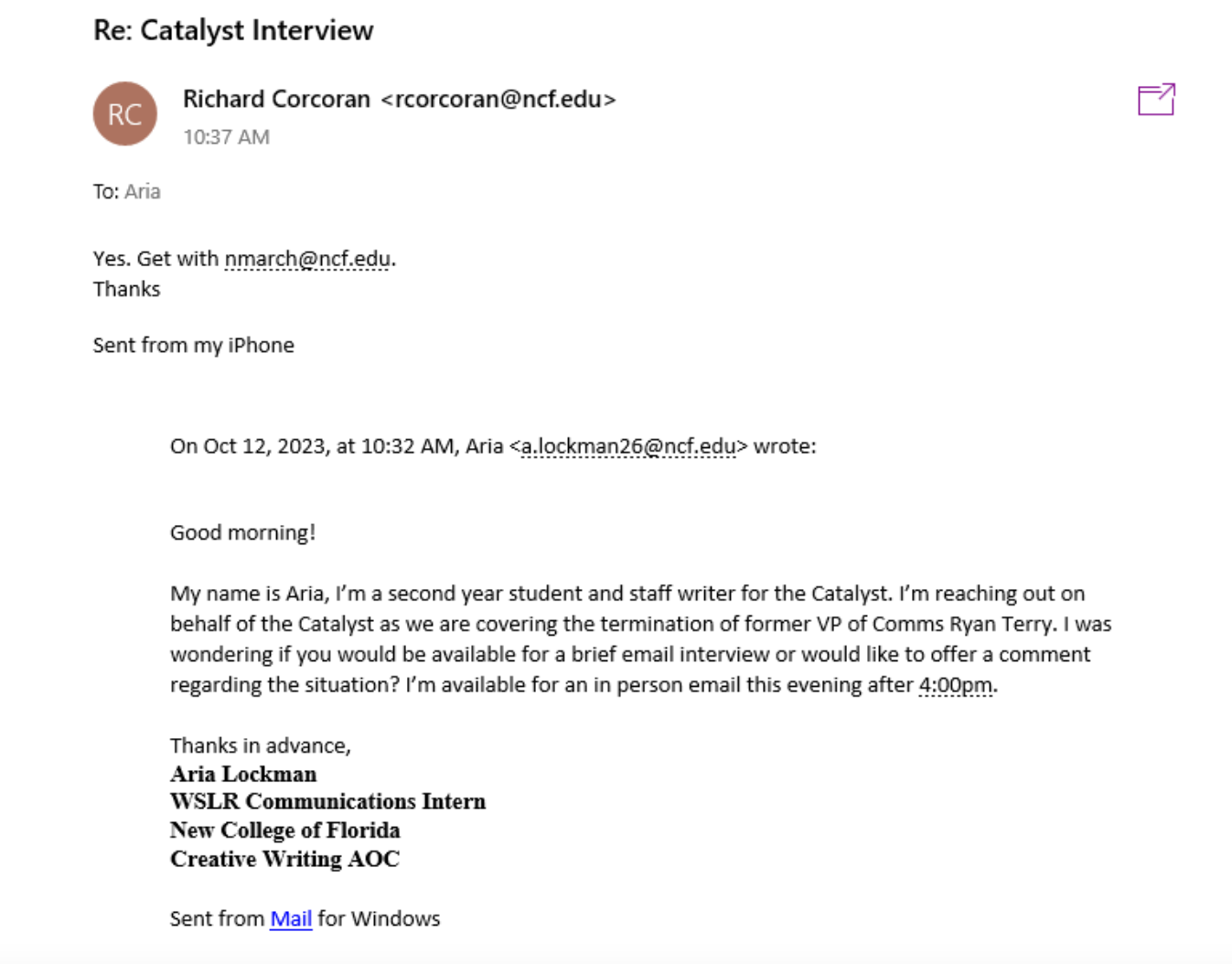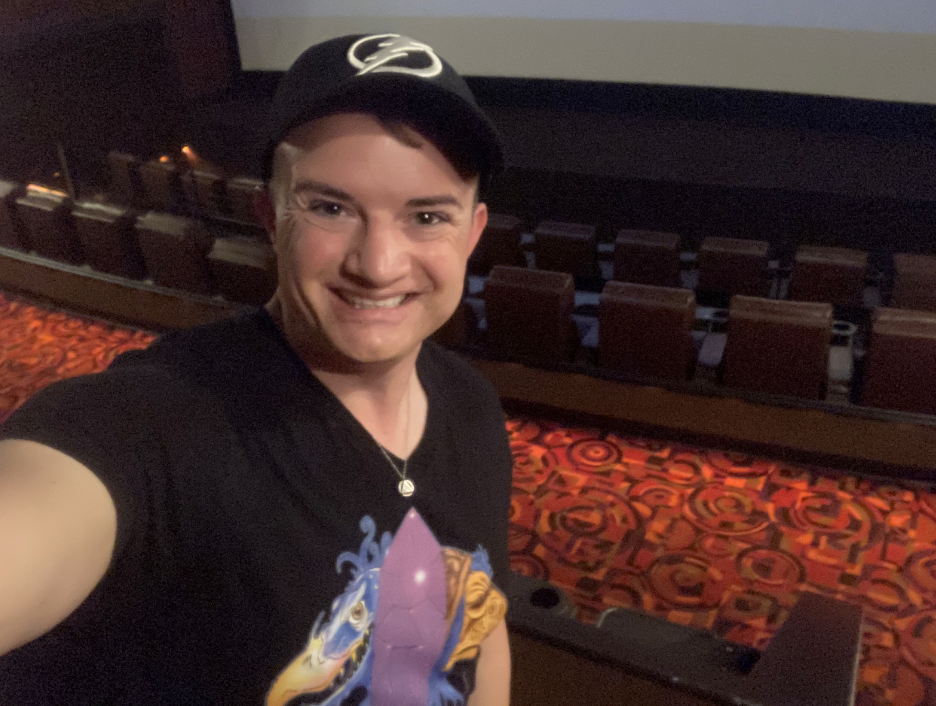On Monday Sept. 2, former New College Vice President (VP) of Communications & Marketing, Ryan Terry, received a call from then Interim President Richard Corcoran stating that he was being terminated from his position after just eight weeks. Terry was in a hotel when he received the call, having spent the weekend in Orlando with his family and friends.
Terry met for an interview with the Catalyst at the Oxford Exchange, a Tampa restaurant. He discussed his time at New College and shared details regarding his termination, which happened the day before the Sept. 3 meeting where the Board of Trustees (BOT) voted in favor of Corcoran as New College President.
“I felt that it was very unprofessional,” Terry said. “I was told that it’s not working out and that my employment was ending.” When Terry asked for an explanation, he said he was told that they were not required to give him one.
“It was very surreal,” Terry described. “It made getting my stuff kind of difficult.”
Due to being in Orlando, Terry was unable to clear out his office himself and instead had to have an individual from Human Resources (HR) handle that for him.
“I didn’t even have my [work] laptop with me—I had to have a colleague of mine at UT who also teaches at Ringling College take the laptop back to New College for me on his way to Ringling,” Terry explained.
When asked about his time at New College, Terry stated, “It was a whirlwind… I didn’t want to go off of what I had heard in the news. I went into the school with an open mind.”
Terry prides himself on his extensive background in communications and marketing. He has a Master’s in Media Studies from University of South Florida (USF) and originally pursued a career in film and media. Before accepting the position with New College, Terry worked as a Public Information Officer for Florida Health. He has about eight years of experience with communications in higher education.
Terry believes New College to be a unique institution: the buildings, the history, the variety and quirkiness of the school are what make New College special. However, he recalled, he also began to realize that the decisions being made didn’t have the students’ best interests in mind.
“The more time I spent with the school, it became clear that the many decisions that were made were not made with the students’ interest,” he explained. “It’s not a political campaign…. It’s a school and it should be treated like a school.
“You don’t run a school like you run a law firm.” Terry stated, acknowledging Corcoran’s former profession in law. “Even before you consider anybody else, you consider your students.
“Unfortunately, I came to realize that New College and how it’s being run does feel like an extension of the DeSantis campaign,” he continued. “It should not be wielded like a political weapon.”
Despite this, Terry wanted to emphasize that the experience wasn’t all bad. He said he met many wonderful people and made a lasting impression on the institution. He refined the Office of Communications & Marketing in order to be more effective and proficient, he explained, and hired the best in their field in order to accomplish this.
During his time with Florida Health, Terry assisted in emergency plans, giving him experience with preparation for natural disasters, specifically hurricanes. When Hurricane Idalia made its way to the west coast of Florida, he created an emergency plan to assist students, faculty and staff.

“I did my part… I got the best people to do the best work and the school is going to benefit from my hiring decisions,” Terry stated.
Terry’s overall goal was to create more positive media. He suggested ideas such as pumpkin carving events and public murals in order to boost campus morale and create more unity among students and faculty.
“The idea was to create an event [where] everybody could participate and at least it would have some semblance of unity behind it,” Terry stressed. “We need organic, positive stories.”
“I wanted to make differences that created a more joyous, welcoming environment by going beyond words, beyond rhetoric… Telling people we have a great business plan really isn’t helpful. We need to show people what we’re doing,” Terry said, emphasizing that words and promises needed to be followed by actions.
He stressed the importance of perception to President Corcoran, especially regarding returning students.
“I recognize that the campus is divided. Administration can say it’s not divided, other people can say it’s not divided all they want, it doesn’t change the fact that it is.” Terry described the division of campus by stating that there are Mighty Banyan students and Null Set students. His goal was to help to create a less tense environment, encouraging students to intermingle with one another.
“The energy is not good… things don’t feel right,” Terry acknowledged, stating that tension is high on campus. “As [campus] is right now, you walk around and you can cut the tension with a dull butter knife.”
Terry said his ideas were not met with a positive outlook, and were rejected.
According to the campus website, New College prides itself on being a place where “free thinkers, risk takers and trail blazers” come to thrive.
“The actions don’t back that up.” Terry observed. “There’s no harm, at least I thought there was no harm, in offering up ideas.”
Terry recalled that he challenged Corcoran in their last meeting before he was terminated, stating that actions needed to be taken in order to produce more positive press and that perception needed to be considered when making decisions.
“When I make decisions, I look at the perception,” Terry stated. “Optics are important. Perception is important.” He said he attempted to counsel Corcoran regarding his decisions and how they would be perceived, but his counseling was not well received.
“I would not characterize it as a very healthy environment right now,” Terry observed about New College. “I hope that it can muddle through this time of transition and emerge a stronger institution.”
Now Terry is trying to move on, acknowledging that it happened and using it as a learning opportunity for the future.
“The jobs at the very top aren’t always the ones that you want because they come with a lot of stress,” Terry explained. “When they fired me, I actually felt relieved… I was having a hard time managing my own life.”
He continues in his position as a Film Studies and Screenwriting Lecturer at the University of Tampa and has gotten back into the habit of volunteering.
Terry volunteers at a ministry that provides clothes and toiletries to the homeless of downtown Tampa. “When I took the position in Sarasota, I was no longer able to volunteer with the homeless like I did on Monday nights… I’ve been doing that for many years and that’s something I had to give up.
“It felt really good to be back,” he said enthusiastically. “Volunteering has always been really important to me.”The Catalyst reached out to President Corcoran for more information, but he did not provide a direct comment. Instead, he directed the Catalyst to Nathan March, Director of Communications & Marketing and Athletics Public Information Officer.

March shared this response:
“Ryan Terry is no longer employed at New College. While we cannot comment on personnel matters, I can assure you that Ryan was an at-will employee, serving under the administration’s supervision, as stated in NCF Regulation 3-4011. An employee who did not work out during the first 60 days in their new role is not uncommon. New College continues to make rapid progress toward restoring its stature among America’s best liberal arts institutions.”

